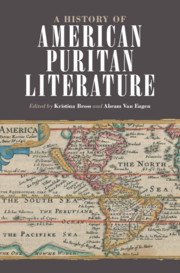Book contents
- A History of American Puritan Literature
- A History of American Puritan Literature
- Copyright page
- Dedication
- Contents
- Figures
- Contributors
- Acknowledgments
- Introduction
- Prologue
- Part I Places
- Part II Approaches
- Chapter 7 Theology
- Chapter 8 Aesthetics
- Chapter 9 Gender
- Chapter 10 Race
- Chapter 11 Print Culture
- Chapter 12 Ritual
- Chapter 13 Manuscript Culture
- Chapter 14 Environment
- Chapter 15 Science
- Chapter 16 Millennialism
- Chapter 17 Postsecularism
- Afterword
- Appendix
- Index
Chapter 14 - Environment
from Part II - Approaches
Published online by Cambridge University Press: 24 September 2020
- A History of American Puritan Literature
- A History of American Puritan Literature
- Copyright page
- Dedication
- Contents
- Figures
- Contributors
- Acknowledgments
- Introduction
- Prologue
- Part I Places
- Part II Approaches
- Chapter 7 Theology
- Chapter 8 Aesthetics
- Chapter 9 Gender
- Chapter 10 Race
- Chapter 11 Print Culture
- Chapter 12 Ritual
- Chapter 13 Manuscript Culture
- Chapter 14 Environment
- Chapter 15 Science
- Chapter 16 Millennialism
- Chapter 17 Postsecularism
- Afterword
- Appendix
- Index
Summary
The chapter begins by differentiating between two English preconceptions of the American environment, wilderness and waste, and characterizes first-generation colonization as a pastoral retreat supported by English georgic assumptions and practices. The chapter then compares puritan and Algonquian conceptualizations of the natural environment, notably including differing conceptions of property, and discusses the influence of puritan justifications of colonization on John Locke’s theorization of land as alienable property. The chapter goes on to trace environmental changes wrought by colonization, including transformations effected by nonhuman agents as well as human agents, and locates these transformations in the climate context of the Little Ice Age. Domestic animals created environments in which certain English plants flourished while indigenous plants declined. Because English grain crops did not prosper in New England, however, the colonists adopted the indigenous grain, maize, and scaled up the indigenous forest-fallow cultivation system to unsustainable levels. Unsustainability in turn invited frontier expansion. The essay concludes by briefly investigating the tension in puritan thought and practice between worldly engagement and spiritual transcendence on both a national level, where it is evident in millennialism, and an individual level, where it shaped puritan poetics.
- Type
- Chapter
- Information
- A History of American Puritan Literature , pp. 275 - 291Publisher: Cambridge University PressPrint publication year: 2020

